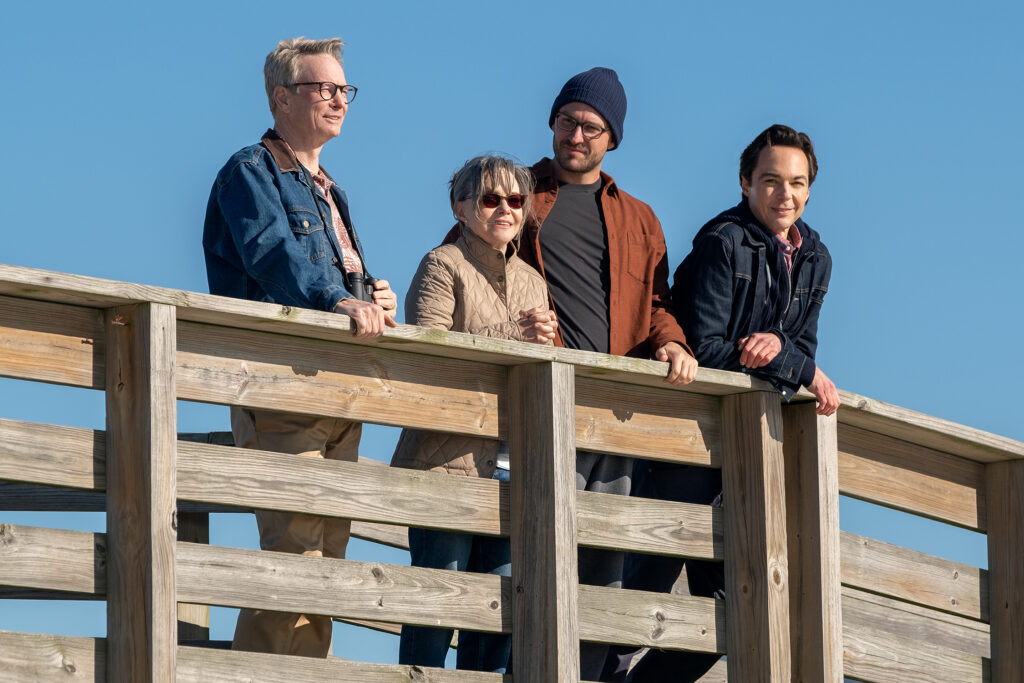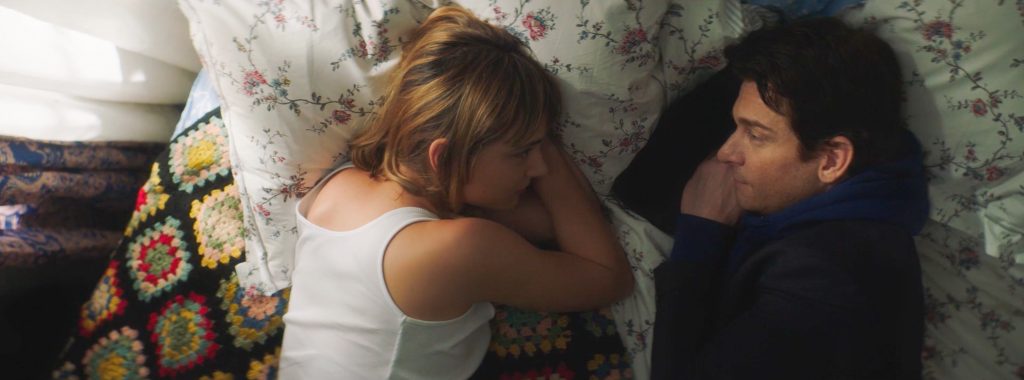December 4, 2022
by Carla Hay

Directed by Michael Showalter
Culture Representation: Taking place from 2002 to 2015, primarily in New York City (and briefly in New Jersey), the dramatic film “Spoiler Alert” (based on a true story) features a predominantly white cast of characters (with some African Americans and Asians) representing the working-class and middle-class.
Culture Clash: Two gay men, who are almost total opposites, meet and fall in love with each other, but their relationship is tested by mistrust/jealousy issues and when one of the men gets cancer.
Culture Audience: “Spolier Alert” will appeal primarily to people who are fans of the book on which the movie is based and will appeal to people who are interested in watching a tearjerking drama about love and loss.

“Spoiler Alert” can get awfully treacly, and the movie’s ending fizzles out in a trite manner, but there are plenty of other things to like about this bittersweet love story. The principal cast members give charming and believable performances. This drama hits a lot of the same, predictable beats of movies about couples whose lives are affected by cancer. However, “Spoiler Alert” offers some unique narrative choices—some that work better than others.
Directed by Michael Showalter, “Spoiler Alert” is based on entertainment journalist Michael Ausiello’s 2018 memoir “Spoiler Alert: The Hero Dies.” David Marshall Grant and Dan Savage co-wrote the “Spoiler Alert” screenplay, which is the movie’s weakest link. The screenplay sometimes does a disservice to this true story by cutting to some cutesy and comedic flashbacks in between scenes that are supposed to be emotionally gut-wrenching.
Some of the movie’s supporting characters are shallow stereotypes, but the relationship between the central couple is depicted in a mostly authentic way. Having talented actors playing the main characters also makes a big difference in the appeal of “Spoiler Alert,” which is watchable, but not quite the overwhelmingly beloved crowd-pleaser that it wants to be. People with empathy will be rooting for this couple, despite most viewers being told from the beginning of the film that one person in the relationship will die of a terminal illness.
That’s because the movie “Spoiler Alert” literally does what the book title “Spoiler Alert: The Hero Dies” does: It reveals that there’s going to be a major death. The very first scene of “Spoiler Alert” shows Michael Ausiello (played by Jim Parsons) and his husband Christopher “Kit” Cowan (played by Ben Aldridge), who are both in their 40s, huddled together on Kit’s hospital death bed in New York City. Kit (who has rectal cancer) has all the signs of someone with a terminal illness who’s about to die.
Michael can be heard saying in a voiceover: “It wasn’t supposed to end this way, but meeting you in the first place was the plot twist I never expected.” It’s possible that many people seeing this movie will already know in advance that someone in this relationship will die. But many other viewers of “Spoiler Alert” won’t really know that before seeing the movie. And when they see this death bed scene in the very beginning of the movie, it really is a “spoiler” with not much of an “alert.”
The problem with telling viewers from the very beginning that Kit is going to die—especially for people who don’t know this death is going to happen before seeing the movie—is that revealing this information so early will lessen the impact of how the death is depicted toward the end of the movie. It also makes the movie essentally a countdown until this tragic death, because viewers will be bracing themselves for the scenes where Kit and his loved ones find out that he has cancer, he goes though inevitable suffering, and then he dies.
Michael is the narrator of “Spoiler Alert,” so a better movie would have let viewers experience the same rollercoaster of emotions of shock, sadness, hope and fear that Michael experienced with Kit during this cancer journey. But viewers don’t get that perspective, because viewers have been told from the beginning that Kit’s cancer journey does not have a happy ending. You can’t get any clearer when a spouse of a cancer patient looks back on the spouse’s final moments on a hospital deathbed and says about the relationship: “It wasn’t supposed to end this way.”
After this hospital deathbed scene (which the movie circles back to toward the end of the film), “Spoiler Alert” becomes mostly a depiction of Michael and Kit’s 13-year relationship in chronological order, beginning in 2002, the year that they met at a gay bar in New York City. In 2002, Michael is a staff writer for TV Guide, while Kit is an aspiring photographer working a day job at Cosi, a fast-casual restaurant that’s part of a nationwide chain of Cosi restaurants.
As Michael explains in a voiceover, Michael has been obsessed with television since he was child. When he was a kid, he liked to imagine that his life would be like a family sitcom called “The Ausiellos,” which is why all his childhood flashback scenes are filmed like a 1980s sitcom, including having a prerecorded laugh track. In these flashbacks, Michael is shown at about 9 or 10 years old (played by Brody Caines), mostly in his family’s living room watching TV. He has fond memories of watching soap operas with his widowed mother (played by Tara Summers), who would later die of cancer when Michael was still a pre-teen.
Michael is the middle of three brothers. His older brother (played by Braxton Fannin) would sometimes tease or bully young Michael about his chubby physique. Later in the movie, during a scene where Michael and Kit are sexually intimate for the first time, a very nervous and awkward Michael confesses that he has had lifelong body issues. Michael describes himself as “FFK: former fat kid.”
Michael thinks TV Guide is his dream job, and he doesn’t mind working the long hours required. However, his demanding work schedule has left little room for his love life. In 2002, at the urging of a friend/co-worker named Nick (played by Jeffrey Self), Michael goes to a gay club during a theme night called Jock Night, where the patrons are encouraged to dress as athletes. Michael goes to the club in his regular clothes.
Michael and Kit have their “meet cute” moment when they see each other across the room. Kit, who immediately smiles at Michael, is wearing a sweatband and workout clothes, like he just walked out of Olivia Newton-John’s 1981 “Physical” video. They eventually introduce themselves to each other and start talking.
Michael is such a self-described TV nerd, he immediately points out that their names (Michael and Kit) are the same names as the main characters in the 1982-1986 TV series “Knight Rider.” Kit doesn’t really get the joke because he never watched “Knight Rider.” It soon becomes obvious to Michael and Kit that they’re almost complete opposites.
Kit is outgoing and confident. Michael is reserved and insecure. Kit likes to dance. Michael doesn’t like to dance, but he eventually does dance with Kit that night. It’s a classic “opposites attract” situation.
It isn’t long before Michael and Kit start kissing each other at the club. Michael doesn’t want them to go back to his place, so Kit agrees with some hesitation that they should go back to Kit’s apartment. Their first sexual encounter is depicted in a semi-comedic way, because Michael is so anxious about everything. Michael also thinks that Kit is too good-looking for him.
After spending the night together on the first night that they met, Michael and Kit begin dating. During their first dinner date together, they find out even more how different they are from each other. Michael has been openly gay since he was a child. He said his mother knew he was gay when Michael was 8 years old, and she noticed Michael had a crush on the “Days of Our Lives” character Bo Brady. Michael says his mother was completely accepting of Michael being gay.
By contrast, Kit is still semi-closeted. His friends know that he’s gay, but he hasn’t told his parents yet. Kit describes his parents as very traditional. Other contrasts: Michael is a TV fanatic. Kit hardly watches TV. Michael grew up with two brothers, who are never seen or mentioned in the movie as adults. Kit is an only child. Michael says that he believes in marriage, while Kit thinks marriage is an outdated institution.
The rest of “Spoiler Alert” chronicles the ups and downs of the relationship between Kit and Michael. Early on in their romance, Michael says to Kit that they should confess to each other what their childhood obsessions were. Michael says his childhood obsessions were soap operas and Christmas. Kit says his childhood obsession was becoming a magician.
Kit soon discovers that Michael has another obsession stemming from Michael’s childhood. Michael has been avoiding bringing Kit over to Michael’s apartment (Michael lives alone) until Kit insists on seeing where Michael lives. Kit is shocked when he finds out that Michael has a major Smurf obsession: Michael’s entire apartment looks like a cluttered Smurf merchandise store. Michael says his Smurf collection reminds him of when his mother was alive and she used to buy him Smurf memorabilia.
Michael’s Smurf obsession is a quirk that Kit accepts because he and Michael are starting to fall in love at this point. However, later in the movie, when Michael and Kit move in together, they live in an apartment where the overload of Smurf merchandise is no longer there. There are some Smurf memorabilia as decorations, but not to the vast extent that Michael had when he lived alone.
It’s an example of how the movie skips over some details that would give the relationship more depth in the movie, such as if there had been some explanation for why such a big part of Michael’s life is no longer in the home that he shares with Kit. Did Michael put most of his Smurf merchandise in storage? Did he sell most of it? Don’t expect the movie to answer to these questions.
“Spoiler Alert” could have used better character development for the people in Michael and Kit’s social circle. On the night that Michael and Kit met, Kit was with a straight female friend named Nina (played by Nikki M. James), who was drunk. Upon meeting Michael, she blurted out that she has a thing for good-looking gay men like Kit, which Nina says is probably why she’s still single. Nina is nothing but a stereotype of a “straight woman friend of a gay man,” whose only purpose in the movie is to make sassy comments.
When Michael and Kit first began dating, Kit had a roommate named Kirby (played by Sadie Scott), who is also an underdeveloped character, for a better reason. As Kit accurately describes her, Kirby is “monosyllabic.” Kirby’s tendency to say one-word sentences becomes a joke in the movie, which makes Kirby look like a parody of an eccentric roommate.
The “Spoiler Alert” dialogue is the wittiest when it involves Michael and his self-deprecating and sarcastic comments. Parsons (former star of the sitcom “The Big Bang Theory”) has made a career out of playing uptight and insecure nerds, so he’s in familiar territory here, and he does it very well. He navigates the comedic moments, as well as the heavier emotional scenes, with great aplomb. Parsons is also one of the “Spoiler Alert” producers.
People who are pop-culture enthusiasts will have the most appreciation for Michael’s jokes, since he makes references to several movies and TV shows. In a hospital scene, where Kit is getting cancer treatment, Michael has a temper tantrum at a nurse because he wants Kit to have a hospital bed when the nurse says all the hospital beds are already occupied. Michael later quips to Kit that it was his Shirley MacLaine moment. It’s a reference to a similar temper-tantrum scene that MacLaine had in the 1983 film “Terms of Endearment,” but people who don’t know that won’t understand the joke.
Aldridge is perfectly adequate as Kit, although “Spoiler Alert” could have done a better job of telling more about Kit’s life outside of his relationship with Michael. There are vague references to Michael and Kit agreeing to not be monogamous when they first started dating. The movie never really explains if that agreement actually changed over time. There’s a brief subplot of how Michael gets jealous of Kit’s handsome co-worker Sebastian (played by Antoni Porowski), because Michael is afraid that Kit will have an affair with Sebastian.
“Spoiler Alert” has an imbalance in how the movie shows the respective career trajectories of Michael and Kit. Michael eventually becomes the founder/editor-in-chief of TVLine (but the movie doesn’t mention his real-life, two-year stint at Entertainment Weekly), and he is shown actually working more than Kit. Kit’s photography career is depicted in vague terms, with the movie making it look like he did occasional freelance photos shoots for mostly unnamed employers. Kit is shown taking more pictures in his free time (such as when he’s with Michael) than in a job.
The sequence where Michael meets Kit’s parents is played for laughs. Michael and Kit have been dating each other for months (before they moved in together), but Kit wants to keep the relationship and his sexuality a secret from his parents. And so, there’s a scene where Kit (who’s in the hospital for appendicitis) asks Michael to go to his apartment and remove all evidence that Kit is gay before Kit’s parents bring Kit home from the hospital. Michael asks sarcastically, “You want me to de-gay your apartment?”
Kit’s parents Marilyn (played by Sally Field) and Bob (played by Bill Irwin) eventually find out that Kit is gay and in a relationship with Michael. (This isn’t spoiler information, since it’s indicated in the movie’s trailer.) Kit’s parents are accepting of everything, but Marilyn is upset that Kit didn’t tell them sooner that he’s gay.
Marilyn, who is a former long-distance running champ, is very domineering, talkative and opinionated. Her personality is in stark contrast to Bob, who is laid-back, quiet and not as judgmental as Marilyn. Field brings a lot of crackling energy to the Marilyn character, but she has played these types of “mother knows best” type of roles many times before, so there’s nothing very revelatory about her acting skills in “Spoiler Alert.”
“Spoiler Alert” handles the cancer part of the story with a mixture of sensitivity and schmaltz. One of the criticisms the movie might get is that it really erases the hard conversations and tough decisions that a terminal cancer patient must make about preparing loved ones for life after the cancer patient dies. It’s a glaring omission that puts “Spoiler Alert” into some shallow territory.
Before Kit had cancer, he and Michael were having problems in their relationship, but those problems are only vaguely referenced in one or two arguments. In one of these arguments, Michael shouts that he’s fed up with Kit’s marijuana addiction, while Kit accuses Michael of becoming a drunk. The movie doesn’t explore these substance-abuse issues in a meaningful way, even though they were big problems in the relationship. The movie has just one short scene of Michael and Kit in a relationship counseling session with a therapist.
There are the expected scenes of Kit’s hair loss and vomiting from chemotherapy, as well as Michael’s tears and denial about how close Kit is to dying. “Spoiler Alert” has some touching scenes of Michael and Kit spending time with Marilyn and Bob in Kit’s final days. These scenes are among the movie’s highlights, because they look the most natural and not overly staged for a movie.
“Spoiler Alert” has its share of flaws (such as an over-reliance and occasional misplacement of the sitcom-formatted childhood flashbacks), but these flaws don’t ruin the movie. The principal cast members give “Spoiler Alert” a lot of warmth and humanity, in a film that sometimes looks overly contrived. In telling this true story, “Spoiler Alert” at least succeeds in delivering what most viewers want to see in this film: a love story that endured in the midst of some very painful and tragic circumstances.
Focus Features released “Spoiler Alert” in select U.S. cinemas on December 2, 2022, with an expansion to more U.S. cinemas on December 9, 2022.


